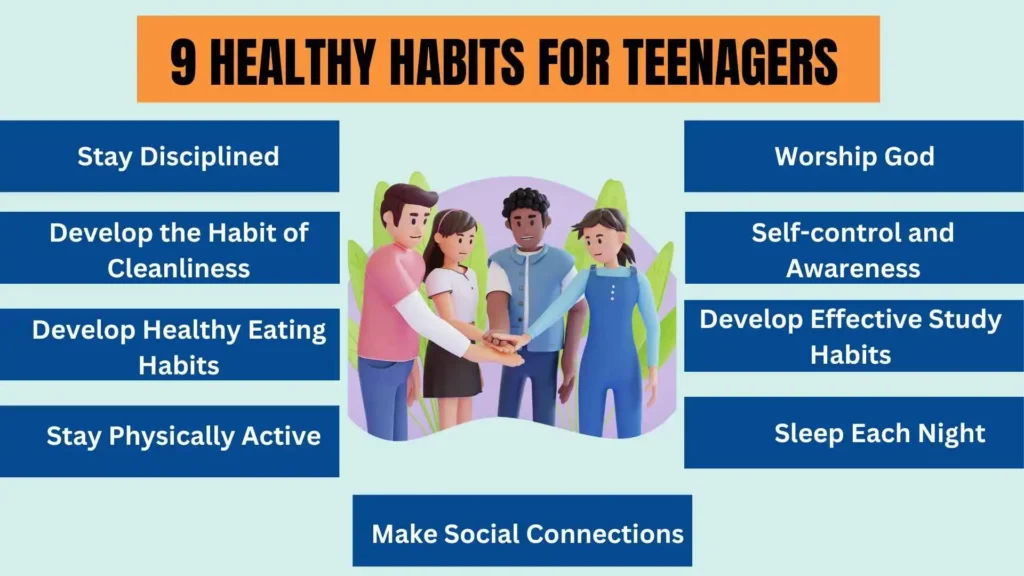As you get old, additional decisions that impact your physical appearance and well-being are made. The key healthy habits for teens to maintain good physical and mental health are eating a balanced diet, receiving regular exercise, and getting adequate sleep. These options can support you.
It is important to develop good habits for teenagers because they help them get better while exercising discipline. Teenage is characterized by the inability to remain consistent, but developing the following habits can be of extreme help.
Table of Contents
9 Healthy Habits for Teens
Teenagers are at a critical stage of development where establishing good habits can set the foundation for a healthy and happy life.
First off, healthy habits for teens are pivotal for physical health. When teenagers eat balanced diets and stay active, their bodies get the nutrients and exercise needed for growth and energy.
The following are some important habits for teenagers.

1. Stay Disciplined
“Discipline is the bridge between goals and accomplishment.” Jim Rohn
Staying disciplined is more than just following rules. It is a cornerstone of a healthy and successful life. For teenagers, this habit is particularly vital as it lays the groundwork for future achievements and well-being.
According to Jim Rohn, “Discipline is the bridge between goals and accomplishment.”
Discipline isn’t about rigid control; it’s about guiding teens to make choices that lead to positive outcomes. This includes sticking to healthy routines, managing time effectively, and setting achievable goals.
Teens who practice discipline are more likely to develop habits that support long-term success and well-being.
Why Discipline is Vital?
Discipline is important for teens due to the following two reasons.
I. Consistent Routine
For teens, maintaining physical health requires regular activity. Discipline helps them stick to a consistent exercise routine, which is vital for building strong muscles and bones and improving cardiovascular health.
Encouraging activities they enjoy, like sports or dancing, and focusing on good habits for teens make it easier to stay active.
II. Stress Management
Disciplined teens often have better coping mechanisms for stress. They can manage their time effectively, which reduces anxiety related to schoolwork and other responsibilities. Mindfulness and meditation are excellent practices that disciplined teens can adopt to manage stress.
2. Develop the Habit of Cleanliness
Cleanliness is more than just a habit; it’s a foundation for a healthy lifestyle. As John Wesley says, “Cleanliness is next to Godliness” John Wesley.”
It is one of the most required healthy habits for teens. For teenagers, developing the habit of cleanliness is crucial for maintaining physical health, boosting self-esteem, and creating a positive environment.
Cleanliness involves keeping oneself and one’s surroundings clean and tidy. For teenagers, it’s not just about avoiding germs; it’s about fostering a sense of responsibility and self-respect. A clean environment can lead to a clearer mind and a more organized life.
Maintaining cleanliness helps prevent the spread of germs and illnesses. Regular hand washing, keeping living spaces clean, and proper food handling are all part of this habit. These practices are vital in protecting teens from common illnesses.
Tips to Develop the Habit of Cleanliness
Some tips for developing the habits of cleanliness are discussed as follows:
I. Tidying up Regularly
Encouraging teens to tidy up their rooms regularly is crucial. This habit helps them develop organizational skills and keep their living space pleasant and functional.
II. Decluttering
Good habits for teens include regular decluttering. Regular decluttering can make a big difference. Helping teens understand the importance of getting rid of unnecessary items can lead to a more manageable and cleaner living environment.
III. Daily Hygiene Practices
Daily hygiene practices, such as showering, brushing teeth, and washing hands, are essential. These habits help teens feel fresh and confident throughout the day.
IV. Making Cleaning Enjoyable
Making cleaning a fun and rewarding activity can help teens stick to their routines. Playing music or setting a timer for a quick cleaning session can make the task more enjoyable.
V. Leading by Example
Parents play a crucial role in helping teens develop the habit of cleanliness. Leading by example and involving teens in household cleaning activities can instill these habits early on.
VI. Clean Clothes
Wearing clean clothes is also part of personal hygiene. Teaching teens to do their laundry and change clothes regularly is important for their overall cleanliness and self-image.
3. Develop Healthy Eating Habits
“You are what you eat”. Anthelme brillat-savarin
Eating is another significant healthy habit for teens. Eating good food is more than just choosing the right foods; it’s a lifestyle that promotes long-term health and well-being.
For teenagers, developing good habits of eating is crucial as it supports growth, boosts energy levels, and helps maintain a healthy weight.
Healthy food habits for teens involve consuming a variety of foods that give you the nutrients you need to maintain your health, feel good, and have energy. These nutrients include protein, carbohydrates, fat, water, vitamins, and minerals.
For teenagers, it’s especially important to eat a balanced diet as their bodies are growing, and 50% of teens’ body weight is gained in teenage.
Tips for Eating Quality Food
The following tips are helpful to develop healthy eating habits.
I. Start with a Balanced Diet
A balanced diet includes a variety of foods from all food groups: fruits, vegetables, lean proteins, whole grains, and low-fat dairy. This ensures that teens get a wide range of nutrients necessary for their growth and health.
II. Include more Fruits and Vegetables
Fruits and vegetables are rich in vitamins, minerals, and fiber. Encourage teens to fill half their plates with these nutrient-dense foods. They can be eaten fresh, frozen, or even dried as snacks.
III. Limit Junk Food
While it’s okay to enjoy junk food occasionally, it should not be a regular part of a teen’s diet. Good habits for teens include healthier alternatives in food like nuts, seeds, yogurt, or fruits when they crave a snack.
IV. Eat Regular Meals
Breakfast is the most necessary health habit for teens. Skipping meals, especially breakfast, can lead to overeating later in the day. Encourage teens to eat three balanced meals a day and have healthy snacks in between. Regular meals keep their metabolism steady and provide consistent energy throughout the day.
V. Role of Parents
Parents play a vital role in shaping their teen’s eating habits and developing healthy habits for teens. By providing nutritious meals at home and being a good role model, parents can encourage teens to make better food choices. Discussing the benefits of healthy eating and involving teens in meal planning and preparation can also make a big difference.
4. Stay Physically Active
“The groundwork for all happiness is good health .”Leigh Hunt
Staying physically active is essential for the overall health and well-being of teenagers. Regular physical activity helps maintain a healthy weight of teens, boosts mood, and improves overall fitness. For teens, building the habit of staying active can set the foundation for a lifetime of good health.
Physical activity involves any movement that works your muscles and requires more energy than resting like aerobic activities. For teenagers, staying physically active is crucial because it supports their growth, enhances their physical health, and improves their mental and emotional well-being.
Tips to Stay Physically Active
As a teen, you can follow the following tips to stay physically active.
I. Find Activities You Enjoy
The key to staying active is finding activities that you enjoy. Whether it’s playing a sport, dancing, hiking, or cycling, choosing something fun makes it easier to stick with it. Teens should explore different activities to discover what they love.
II. Make it a Social Activity
Exercising with friends or family can make physical activity more enjoyable and less of a chore. Joining a sports team, a fitness class, or simply going for a walk with a friend can make a big difference.
III. Limit Screen Time
Reducing time spent on screens, such as watching TV, playing video games, or using a computer, are good habits for teens. They can free up more time for physical activities. Encouraging teens to balance screen time with active hobbies is crucial.
5. Make social connections
Social connections refer to the relationships we have with others, including family, friends, classmates, and even acquaintances. For teenagers, these connections are vital as they navigate the complexities of growing up.
Positive social interactions can help teens develop empathy, communication skills, and a sense of belonging. As John Donne has said, “No man is an island”.
Building and maintaining social connections and healthy relationship habits is an essential part of developing healthy habits for teens. Positive social interactions boost mental health, enhance emotional well-being, and provide a sense of belonging.
Strong social connections are linked to better mental health. Teens who have close friends and supportive family members are less likely to experience feelings of loneliness, depression, and anxiety. Social interactions stimulate the release of hormones that reduce stress and promote happiness.
Having a network of supportive friends and family provides a sense of security and self-worth. Teens who feel connected to others are more confident, resilient, and capable of handling life’s challenges.
Tips to Make a Social Connection
The following tips can be used to make a social connection.
I. Volunteer
Volunteering is a great way for teens to meet new people while giving back to the community. It can also boost their self-esteem and provide a sense of purpose. Many schools and organizations offer volunteer opportunities tailored for teenagers.
II. Join Clubs or Groups
Encourage teens to join clubs, sports teams, or hobby groups that interest them. These environments provide opportunities to meet like-minded peers and build friendships based on shared interests.
III. Be Open and Approachable
Teens should practice being open and approachable. Smiling, making eye contact, and being willing to start conversations can make it easier to connect with others. Encouraging teens to step out of their comfort zones can lead to meaningful interactions.
IV. Use Social Media Wisely
Social media can be a valuable tool for staying connected with friends and making new ones. However, it’s a crucial healthy habit for teens to use wisely. Encourage teens to engage in positive interactions online and to balance their screen time with face-to-face socializing.
6. Develop Effective study habits
“Success is the sum of small efforts, repeated day in day out.” Robert Collier
Among many Good habits for teens, one cannot undervalue studying. Developing effective study habits is crucial for teenagers to succeed academically and build a foundation for lifelong learning. Good study habits can improve comprehension, enhance retention, and reduce stress.
Effective study habits are essential for mastering new information and achieving academic success. They help students manage their time efficiently, stay focused, and make the most of their study sessions.
Tips to Develop Effective Study Habits
Teens can study with the help of the following tips.
I. Designate a Study Space
Creating a dedicated study space free from distractions can enhance focus and productivity. Whether it’s a quiet corner in the bedroom or a spot in the library, a designated study area can make a big difference.
II. Create a Study Schedule
Having a consistent study schedule is crucial. Encourage teens to set aside specific times each day for studying. This helps build a routine and ensures that study time becomes a regular part of their day.
IV. Use Active Learning Techniques
Active learning techniques like summarizing information, teaching it to someone else, or using flashcards can improve understanding and retention. Encourage teens to engage with the material actively rather than passively reading or highlighting.
7. Sleep Each Night
Getting enough sleep each night is essential for the overall health and well-being of teenagers. Quality sleep supports physical and mental development, enhances mood, and improves cognitive function. During sleep, the body repairs and rejuvenates tissues consolidates memories and regulates hormones.
Adequate sleep supports physical health by boosting the immune system, promoting growth and development, and regulating metabolism. Teens who get enough sleep are less likely to experience health issues such as obesity, diabetes, and cardiovascular problems.
Tips for Sleeping Each Night
You can build healthy sleep habits and sleep well each night with the help of the following tips.
I. Establish a Consistent Sleep Schedule
Encourage teens to go to bed and wake up at the same time every day, even on weekends. Consistency helps regulate the body’s internal clock and promotes better sleep quality.
II. Create a Relaxing Bedtime Routine
Developing a relaxing bedtime routine signals to the body that it’s time to wind down. Activities such as reading, taking a warm bath, or practicing relaxation techniques can help prepare the mind and body for sleep.
III. Avoid Screen before Bedtime
Exposure to screens, such as smartphones, computers, and TVs, before bedtime can interfere with sleep quality. Encourage teens to limit screen time to at least an hour before bed and engage in calming activities instead.
8. Self-control and Awareness
Self-control involves the ability to regulate one’s thoughts, emotions, and behaviors, particularly in challenging situations. As Plato has said, “The first and best victory is to conquer self.”
Awareness, on the other hand, refers to being mindful of one’s thoughts, feelings, and surroundings. Together, these habits enable teens to make conscious choices and respond to situations with clarity and intention.
Self-control and awareness are essential habits for teenagers to develop as they navigate the challenges of adolescence and prepare for adulthood. These habits empower teens to make informed decisions, regulate their emotions, and resist impulsive behaviors.
Tips for Developing Self-control and Awareness
Teens can develop self-control with the help of the following tips.
I. Develop Healthy Coping Strategies
Help teens develop healthy coping strategies for managing stress and difficult emotions. Encourage activities such as exercise, creative expression, spending time in nature, or talking to a trusted friend or adult.
II. Set Clear Goals
Encourage teens to set clear, achievable goals for themselves. Having a sense of purpose and direction helps teens stay focused and motivated, making it easier to exercise self-control and make decisions that align with their aspirations.
III. Learn to Delay Gratification
Teach teens the importance of delaying gratification and resisting immediate impulses in favor of long-term rewards. This skill, often referred to as “delayed gratification,” is associated with greater success in various areas of life, including academics, career, and relationships.
9. Worship God
Encouraging teenagers to incorporate worship and prayer to make praising God a habit into their daily routines is more than just a religious practice; it’s about nurturing their spiritual well-being and developing a sense of connection to something greater than themselves.
Research indicates that regular worship can have positive effects on mental health, reducing stress and promoting feelings of peace and gratitude.
Tips to Develop the Habit of Daily Worship
The following tips are helpful in developing the habit of daily worship.
I. Practice Gratitude
Encourage teens to incorporate gratitude into their prayers, reflecting on the blessings in their lives and expressing thanks to a higher power.
II. Utilize Resources
Provide teens with access to resources such as books, podcasts, or online communities that offer guidance and inspiration for spiritual growth.
III. Explore different Forms of Worship
Teens can experiment with various forms of worship, such as meditation, singing, reading sacred texts, or attending religious services, to find what resonates most with them.
You can uncover the 7 Habits of Highly Effective Teens, written by Sean Covey, to understand more about the healthy lifestyle of teens.
Final thoughts
Developing healthy habits for teens is not just about physical well-being; it’s about equipping them with the tools they need to do their best in all aspects of life. From nutritious eating and regular exercise to managing self-control and awareness, these habits lay the foundation for a lifetime of wellness and success.
By prioritizing their health and making conscious choices, teens can boost their academic performance, enhance their mental and emotional resilience, and build strong relationships.
With support from parents, schools, and communities, teens can embrace these habits and embark on a journey toward a happier, healthier future.




